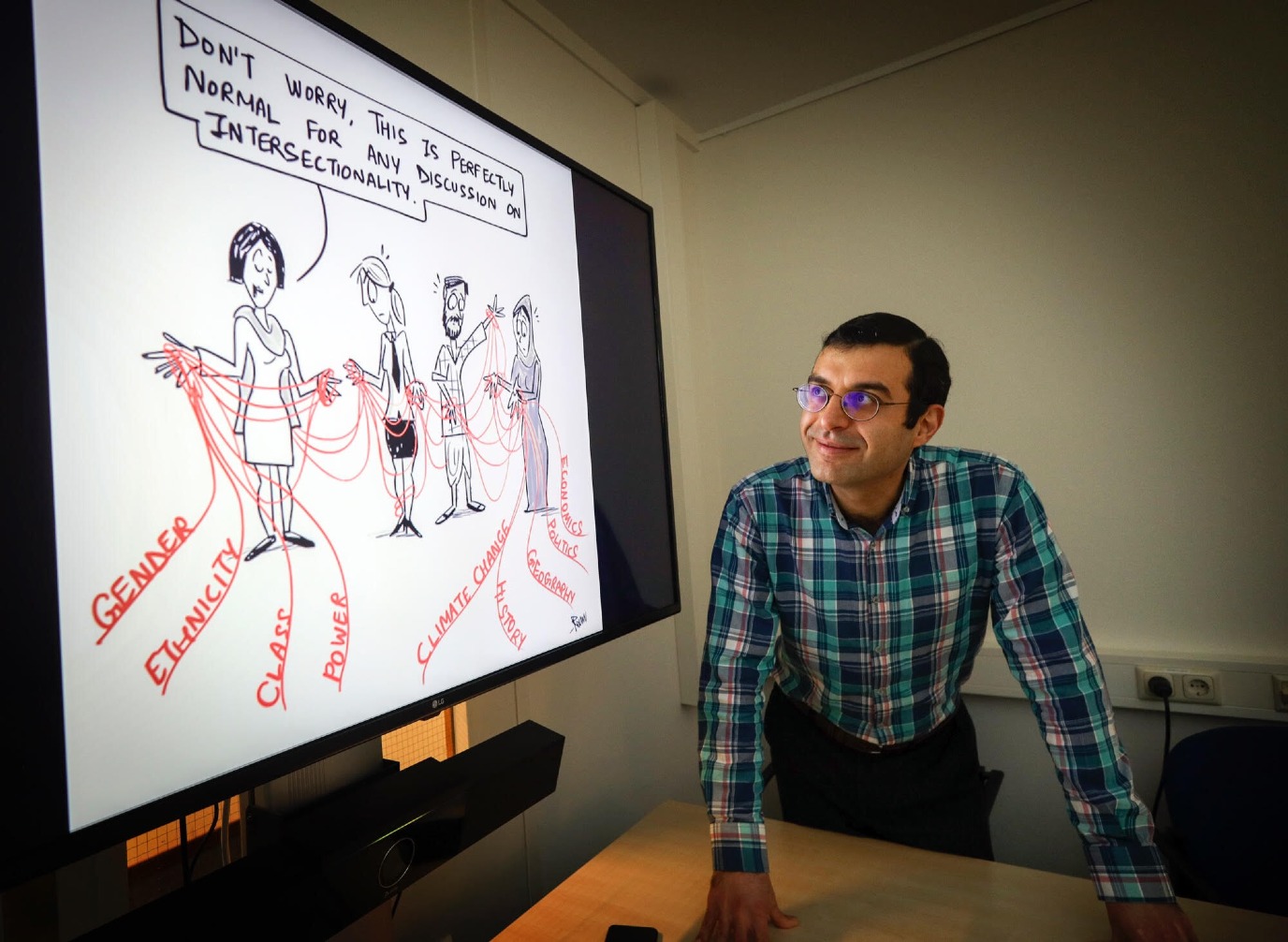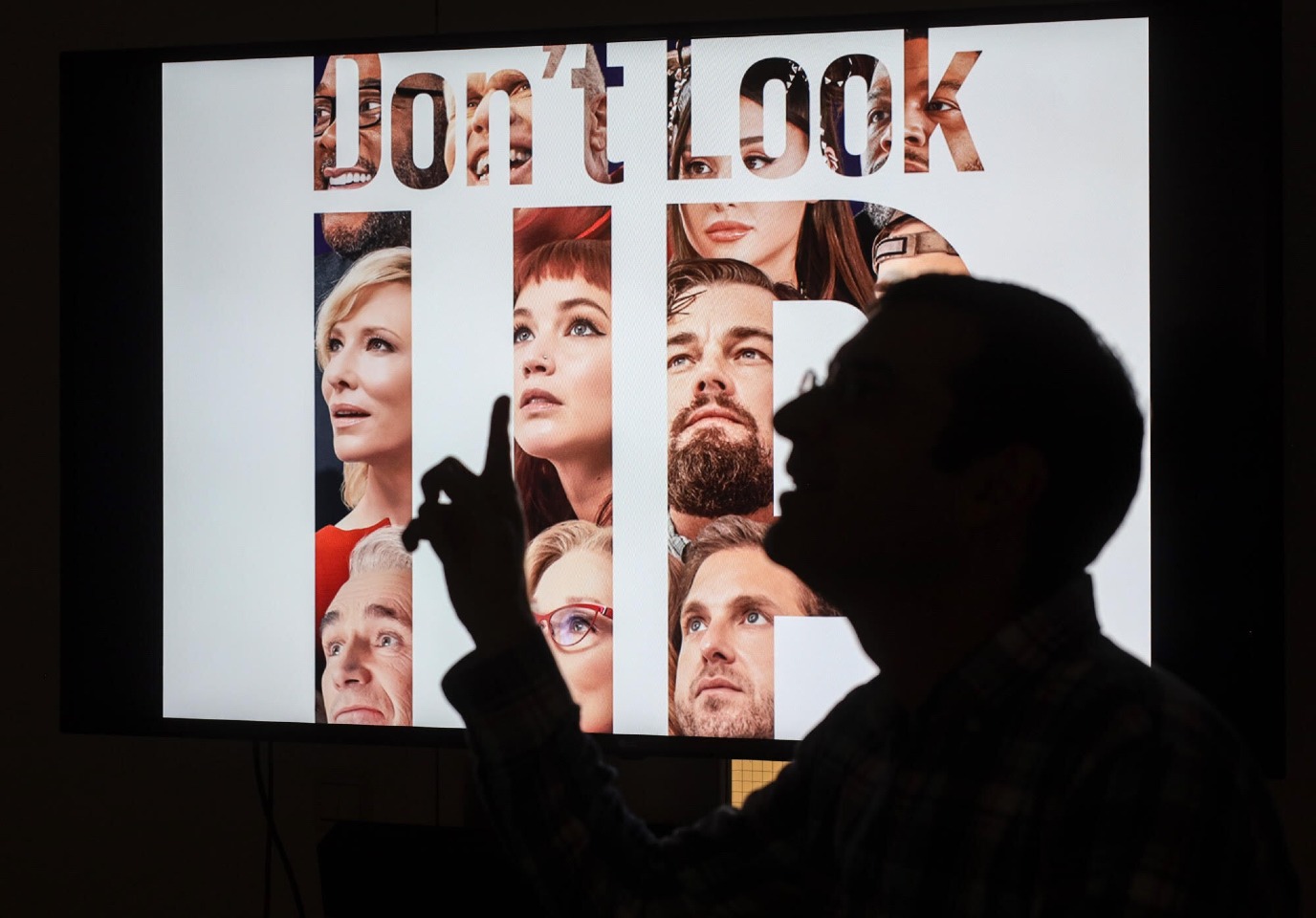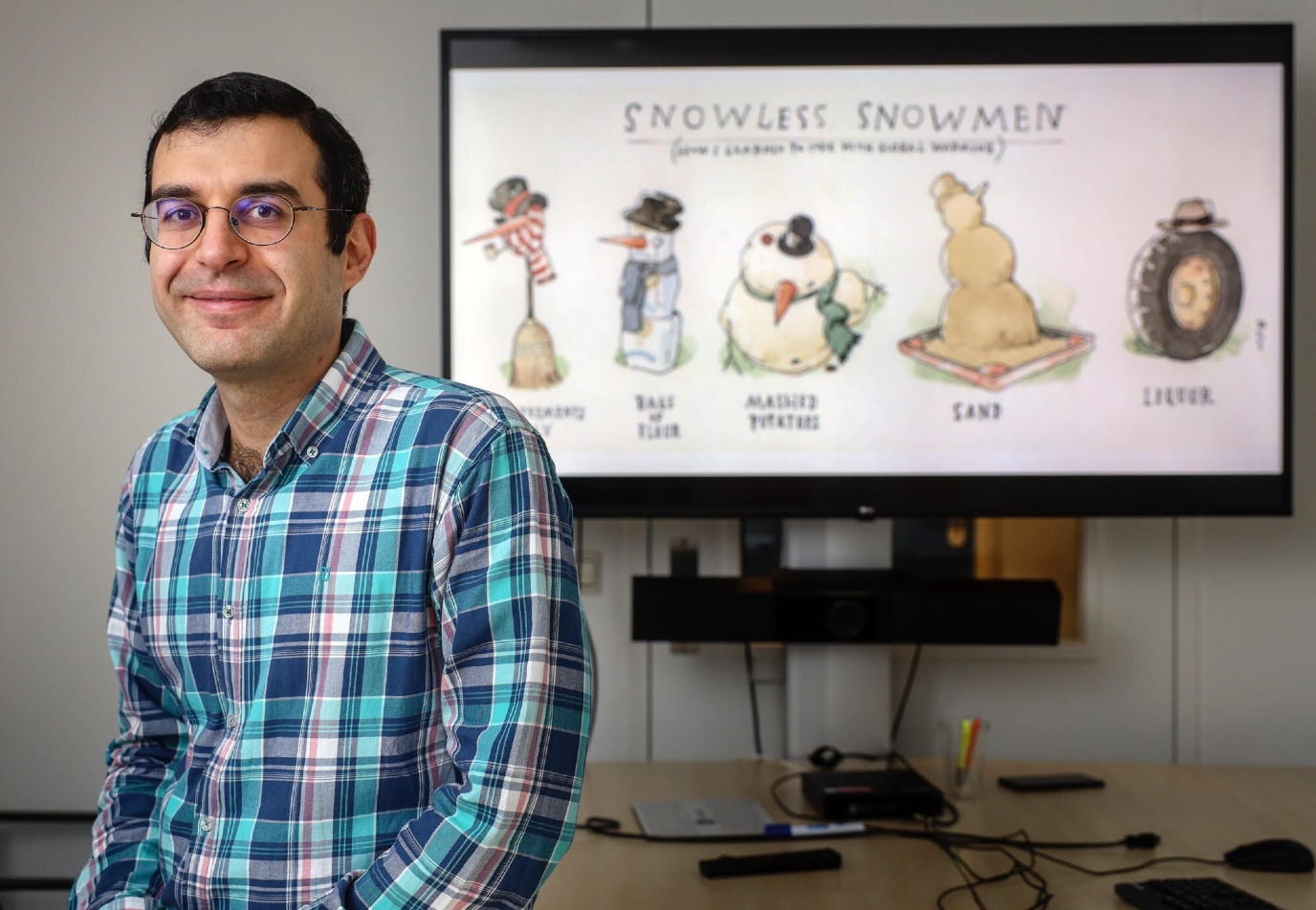Humour facilitates environmental advocacy
Floods, droughts, wildfires, and food shortages: a lot of communication about the environment carries apocalyptic messages. Constant fear about climate change can cause people to become numb and oblivious, or lapse into eco-anxiety. However, humour and satire, can help keep environmental communication positive and encourage eco awareness, argues UG researcher Massih Zekavat.
Text: Jelle Posthuma / Photos: Henk Veenstra
Messages or stories about climate change often paint an apocalyptic picture of the future. ‘Fear can be a strong motivator, but if you are constantly scared, there is a risk that your fear turns into anxiety,’ says Zekavat. And anxiety can actually be numbing. ‘For the purposes of self-protection, people may decide to stop listening to the deluge of negative news. They cannot solve climate change on their own so they choose to block out the negative news to protect their mental health.'

To put it briefly, we need to look for hope and positive action. Humour, satire, and comedy can convey messages about climate change to citizens, corporations, and policymakers in an ethically positive way, argues Zekavat. His research covers a wide range of environment-related expressions in popular media, including The Simpsons, South Park, various late-night shows, books, and cartoons. Humour, satire, and comedy are the common denominator.
Zekavat has a background in literary and cultural studies. ‘I had to teach myself some environmental psychology and social psychology. Climate change is a very complex problem, so you need different perspectives to fully grasp the issue,’ he explains. The researcher applies theories and approaches from cultural and literary studies to understand how language is used. ‘This includes not only written or verbal language but also symbols used for communication, such as images. In my work, I try to understand these multimodal texts.’

Repressive regimes
His fascination with humour, satire, and comedy started during his time at university in Iran. 'It is difficult to reflect on it because I was involved in it myself. But I think the political atmosphere in which I studied and lived played a big role. Iran is a repressive theocracy; the regime does everything it can to limit freedom of expression. In these circumstances, satire can be an outlet for dissent.'
Research shows that humour, satire, and comedy can help to cope with certain circumstances, including climate change. ‘Some problems can be solved. If you have an issue with a colleague, you can talk to them or perhaps seek help from the HR department. But some problems cannot be solved, such as the loss of loved ones. Humour and satire can help us deal with them emotionally. For example, after the September 11 attacks, South Park aired an episode about Osama Bin Laden. A similar response was seen after the Charlie Hebdo attack,’ Zekavat explains.
The researcher also highlights the importance of humour and satire in relation to adaptation. ‘Adaptation is driven by social processes. As an individual, you cannot change the system in repressive regimes. All the power, money, and weapons are in the hands of a few. Satire and humour can, however, help individual citizens adapt to the situation. During the Arab Spring, we saw several examples of this.'

Inequality
Humour and satire can help deal with climate change. However, to what extent is climate change reversible? ‘I am not a climate scientist,’ Zekavat replies. ‘I believe we may be able to partially mitigate climate change. At the same time, some consequences are already irreversible, such as species extinction.’ Zekavat highlights another important caveat: ‘Rich Western countries often talk about “coping” and “resilience,” despite being responsible for the climate crisis. Meanwhile, countries that have contributed practically nothing to the crisis are paying the price, experiencing consequences such as droughts and floods.’
Still, Zekavat stresses, humour and satire have an important role to play in addressing inequality. ‘It is a way of speaking out against powerful countries and corporations, or, in other words, speaking truth to power.’ According to the researcher, conveying information is another key element. ‘Research shows that humour makes messages more memorable and can increase the power of persuasion.’
Influencing behaviour
Ultimately, a powerful message can help encourage eco-friendly behaviour. ‘In psychology, there is a concept called ‘nudging’. Supermarkets place products like chocolates and batteries near the cash register to provide a nudge, encouraging people to buy them. However, nudging can also be used for ethically positive purposes, such as encouraging people to change their behaviour. Humour and satire can help reinforce this effect.’
The researcher provides an example from Sweden. ‘In Sweden, they used nudging to reduce street litter, particularly cigarette butts. A poster featuring a pigeon with a nicotine patch was put up. The caption read: "Please don't throw your cigarette butt on the street. Pigeons are trying to quit smoking." It eventually led to a 70 percent reduction in cigarette butts on the streets.'
In his work, Zekavat does not just look at individual behaviour. 'Climate change is a global problem. Individuals can do very little compared to companies and policymakers. That is why it is important to focus particularly on these groups.' Some critics argue that humour, satire, and comedy are too ‘light-hearted’ for an issue as serious as the climate crisis, the researcher continues. 'But they can actually be used to counter arguments from climate deniers or sceptics. British-American comedian John Oliver demonstrates this in his show.’

Easy target
However, humour and satire can also be used in unethical ways. ‘I argue that while humour and satire can be powerful weapons, they are by no means always about positive power. The same applies to language in general. There are examples of repressive regimes using humour and satire. Similarly, there are a lot of racist and sexist jokes in the US right now, serving the interests of certain communities and classes.’
According to Zekavat, the crux of the matter is whether a joke ‘punches up’, or ‘punches down’. He cites Donald Trump as an example, whose jokes often target vulnerable, marginalized, or disenfranchised communities or individuals. 'In the case of environmental issues, Trump repeats the GOP slogan: “Drill, baby, drill!” I would say it is not very humorous. Yet it resonates with the people who attend his rallies,' the researcher concludes.
More information
More news
-
19 January 2026
Digitization can leave disadvantaged citizens in the lurch
-
13 January 2026
Doing good in complex situations
